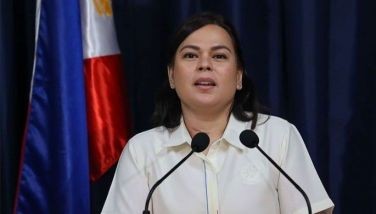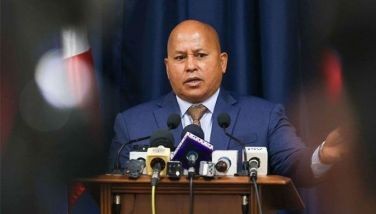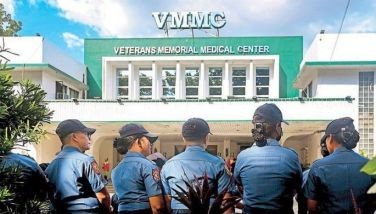Ayala student leaders face challenging times
February 9, 2007 | 12:00am
ALFONSO, Cavite - All 74 student leaders attending the Ayala Young Leaders Congress (AYLC) ongoing at the San Miguel Management Training Center here were born after the 1986 People Power Revolution, or EDSA I.
The meaning and implications of that and subsequent EDSA "revolutions" â€â€ÂEDSA II in January 2001 and EDSA 3 in May 2001â€â€Âwere among the topics these outstanding students dealt with on the opening day of the congress last Wednesday.
Chosen from among 498 nominations from 103 schools nationwide, the delegates are focusing on emerging leadership challenges arising from struggles faced by the country today. In lectures, panel and small group discussions as well as one-on-one interactions, a roster of prominent speakers and experts will guide the youth leaders in examining the present state of the nation as well as specific issues like migration and the brain drain, peace and security, and the influence of and challenges facing print and broadcast media today.
In welcoming the ninth batch of Ayala young leaders, Ayala Corp. president and COO Fernando Zobel de Ayala reaffirmed the "power of the youth to transform society." While the AYLC is a flagship project of the Ayala group, he stressed that the conference is not about the Ayala group but "about people and the world outside â€â€Ânot about the present but about the future."
"This conference is about your obligation to realize yourselves in the service of your communities. This conference is about service to higher purposes than Ayala‘s corporate goals or your ambitions for individual success. This conference is about building a better world according to our best lights," Zobel told the delegates.
Zobel set the tone for the conference by challenging the delegates to "prepare yourselves to be internationally competitive, whether you stay in the country or go abroad. You must lead this country to a future where every Filipino can hold his own against his peers around the world â€â€Âbe it in technology, in art, in business, or in development."
Keynote speaker retired Supreme Court Chief Justice Artemio Panganiban gave the audience â€â€Âwhich included top officials of Ayala companies led by chairman emeritus Jaime Zobel de Ayala, chairman and CEO Jaime Augusto Zobel de Ayala, Manila Water president Antonino Aquino, and Ayala Foundation president Vicky Garchitorena â€â€Âan inside look at the workings of the judicial system and three pillars of his vision statement as chief justice.
As the country’s highest magistrate, first among the high court’s 15 justices, the chief justice is also "the leader of the entire judicial branch of government composed of about 2,000 justices and judges plus about 26,000 employees nationwide, as well as of the Philippine bar composed of about 40,000 lawyers." He undergirded this leadership with four characteristics, which he calls the "four Ins": independence, integrity, industry, and intelligence, and sought to reform the justice system by "fighting the four ACID problems that corrode justice in our country: limited access to justice by the poor, corruption, incompetence, and delay in the delivery of quality judgments."
Panganiban’s vision is of "a judiciary that safeguards the liberty and nurtures the prosperity of our people under the rule of law."
In safeguarding liberty, Panganiban notes that "an individual becomes a majority of one when courts uphold that person’s freedom," even or especially when that freedom is "transgressed" by the state.
"In litigations involving civil liberties, I believe that the scales of justice weigh heavily against the government and in favor of the people," he said, citing three landmark decisions promulgated last year under his incumbency that upheld civil liberties over government action: striking down Executive Order 464 which prohibited executive officials from appearing before Congress, the so-called Calibrated Preemptive Response policy, and Proclamation 1017 on the state of national emergency.
He points to provisions in the Constitution that involve the Judiciary in contributing to nurturing prosperity, while acknowledging that the Executive and Legislative branches have the primary responsibility for economic development. "What the spirit and the letter of the Constitution demand is the institutionalization of social justice," Panganiban asserts.
He warns against short cuts to justice, upholding the principle of due process, emphasizing that the rule of law differentiates "libertarianism from authoritarianism," just as it differentiates "democracy from the rule of the mob," alluding to the Supreme Court’s decision shooting down last year’s people’s initiative for constitutional change. "The mere fact that, allegedly, six million people have lodged a petition to initiate changes in our Constitution in violation of the constitutional procedures governing amendments and revisions is of no moment; it cannot be allowed," he stressed.
Questioned by a delegate on the constitutional bases of the EDSA revolutions, Panganiban clarified that EDSA I responded to the will of the people, even though it was extra-constitutional, while EDSA II followed the constitutional process of succession where the vice president assumed the presidency when the withdrawal of support by the military, police and even members of the Cabinet from the sitting president resulted, in effect, in the absence of a functioning government.
While time constraints limited the open forum following his speech, delegates took the opportunity and surrounded the former Chief Justice not just for photo- ops but to pose further questions and continue discussions.
A panel discussion on "A Nation in Crisis: Quo Vadis Filipino?" was held in the afternoon with Professor Randy David and former economic planning secretary Solita Monsod, with McCann Phils. chairman emeritus Emily Abrera moderating.
Yesterday, the issue of migration and the brain drain was discussed by Ayala Land president Jim Ayala, Philippine Philharmonic Orchestra music director Eugene Castillo, and JP Orbeta, head of human resources development of Ayala Corp. The session was moderated by Vicky Garchitorena. "Solving the Peace Puzzle" had Tabang Mindanaw’s Milette Mendoza, Archbishop Tony Ledesma and Alim Elias Macarandas of the Bishop-Ulama Conference, with news anchor Ricky Carandang as moderator.
Today’s panel discussion on the media will feature STAR president and CEO Miguel G. Belmonte, ABS-CBN’s Luchi Cruz-Valdez, and GMA-7’s Malou Mangahas, with Probe Team’s Cheche Lazaro as moderator.
The delegates are divided into small groups of about 10 for in-depth discussions on the topics. They also participate in outdoor challenge activities supervised by Asia Ability, aimed at fostering team spirit and mutual trust.
The conference ends today, with Ayala chairman emeritus Jaime Zobel de Ayala as closing speaker. Globe Telecoms will host the closing party, as this year’s delegates are inducted into the Ayala Young Leaders Alliance, the official alumni network of the AYLC, which has 580 members from the previous eight conferences.
Many AYLC alumni have assumed critical leadership positions not just in the country but internationally, helping fulfill Ayala’s dream of developing a "corps of national servant leaders who will use their leadership ability to uplift the lives of all Filipinos."
The meaning and implications of that and subsequent EDSA "revolutions" â€â€ÂEDSA II in January 2001 and EDSA 3 in May 2001â€â€Âwere among the topics these outstanding students dealt with on the opening day of the congress last Wednesday.
Chosen from among 498 nominations from 103 schools nationwide, the delegates are focusing on emerging leadership challenges arising from struggles faced by the country today. In lectures, panel and small group discussions as well as one-on-one interactions, a roster of prominent speakers and experts will guide the youth leaders in examining the present state of the nation as well as specific issues like migration and the brain drain, peace and security, and the influence of and challenges facing print and broadcast media today.
In welcoming the ninth batch of Ayala young leaders, Ayala Corp. president and COO Fernando Zobel de Ayala reaffirmed the "power of the youth to transform society." While the AYLC is a flagship project of the Ayala group, he stressed that the conference is not about the Ayala group but "about people and the world outside â€â€Ânot about the present but about the future."
"This conference is about your obligation to realize yourselves in the service of your communities. This conference is about service to higher purposes than Ayala‘s corporate goals or your ambitions for individual success. This conference is about building a better world according to our best lights," Zobel told the delegates.
Zobel set the tone for the conference by challenging the delegates to "prepare yourselves to be internationally competitive, whether you stay in the country or go abroad. You must lead this country to a future where every Filipino can hold his own against his peers around the world â€â€Âbe it in technology, in art, in business, or in development."
Keynote speaker retired Supreme Court Chief Justice Artemio Panganiban gave the audience â€â€Âwhich included top officials of Ayala companies led by chairman emeritus Jaime Zobel de Ayala, chairman and CEO Jaime Augusto Zobel de Ayala, Manila Water president Antonino Aquino, and Ayala Foundation president Vicky Garchitorena â€â€Âan inside look at the workings of the judicial system and three pillars of his vision statement as chief justice.
As the country’s highest magistrate, first among the high court’s 15 justices, the chief justice is also "the leader of the entire judicial branch of government composed of about 2,000 justices and judges plus about 26,000 employees nationwide, as well as of the Philippine bar composed of about 40,000 lawyers." He undergirded this leadership with four characteristics, which he calls the "four Ins": independence, integrity, industry, and intelligence, and sought to reform the justice system by "fighting the four ACID problems that corrode justice in our country: limited access to justice by the poor, corruption, incompetence, and delay in the delivery of quality judgments."
Panganiban’s vision is of "a judiciary that safeguards the liberty and nurtures the prosperity of our people under the rule of law."
In safeguarding liberty, Panganiban notes that "an individual becomes a majority of one when courts uphold that person’s freedom," even or especially when that freedom is "transgressed" by the state.
"In litigations involving civil liberties, I believe that the scales of justice weigh heavily against the government and in favor of the people," he said, citing three landmark decisions promulgated last year under his incumbency that upheld civil liberties over government action: striking down Executive Order 464 which prohibited executive officials from appearing before Congress, the so-called Calibrated Preemptive Response policy, and Proclamation 1017 on the state of national emergency.
He points to provisions in the Constitution that involve the Judiciary in contributing to nurturing prosperity, while acknowledging that the Executive and Legislative branches have the primary responsibility for economic development. "What the spirit and the letter of the Constitution demand is the institutionalization of social justice," Panganiban asserts.
He warns against short cuts to justice, upholding the principle of due process, emphasizing that the rule of law differentiates "libertarianism from authoritarianism," just as it differentiates "democracy from the rule of the mob," alluding to the Supreme Court’s decision shooting down last year’s people’s initiative for constitutional change. "The mere fact that, allegedly, six million people have lodged a petition to initiate changes in our Constitution in violation of the constitutional procedures governing amendments and revisions is of no moment; it cannot be allowed," he stressed.
Questioned by a delegate on the constitutional bases of the EDSA revolutions, Panganiban clarified that EDSA I responded to the will of the people, even though it was extra-constitutional, while EDSA II followed the constitutional process of succession where the vice president assumed the presidency when the withdrawal of support by the military, police and even members of the Cabinet from the sitting president resulted, in effect, in the absence of a functioning government.
While time constraints limited the open forum following his speech, delegates took the opportunity and surrounded the former Chief Justice not just for photo- ops but to pose further questions and continue discussions.
A panel discussion on "A Nation in Crisis: Quo Vadis Filipino?" was held in the afternoon with Professor Randy David and former economic planning secretary Solita Monsod, with McCann Phils. chairman emeritus Emily Abrera moderating.
Yesterday, the issue of migration and the brain drain was discussed by Ayala Land president Jim Ayala, Philippine Philharmonic Orchestra music director Eugene Castillo, and JP Orbeta, head of human resources development of Ayala Corp. The session was moderated by Vicky Garchitorena. "Solving the Peace Puzzle" had Tabang Mindanaw’s Milette Mendoza, Archbishop Tony Ledesma and Alim Elias Macarandas of the Bishop-Ulama Conference, with news anchor Ricky Carandang as moderator.
Today’s panel discussion on the media will feature STAR president and CEO Miguel G. Belmonte, ABS-CBN’s Luchi Cruz-Valdez, and GMA-7’s Malou Mangahas, with Probe Team’s Cheche Lazaro as moderator.
The delegates are divided into small groups of about 10 for in-depth discussions on the topics. They also participate in outdoor challenge activities supervised by Asia Ability, aimed at fostering team spirit and mutual trust.
The conference ends today, with Ayala chairman emeritus Jaime Zobel de Ayala as closing speaker. Globe Telecoms will host the closing party, as this year’s delegates are inducted into the Ayala Young Leaders Alliance, the official alumni network of the AYLC, which has 580 members from the previous eight conferences.
Many AYLC alumni have assumed critical leadership positions not just in the country but internationally, helping fulfill Ayala’s dream of developing a "corps of national servant leaders who will use their leadership ability to uplift the lives of all Filipinos."
BrandSpace Articles
<
>
- Latest
- Trending
Trending
Latest
Trending
Latest
Recommended




























